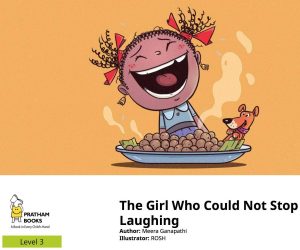 In The Girl Who Could Not Stop Laughing, we hear a tale of a girl who keeps laughing. And we learn while it might cause problems in class, as long as you’re not laughing at someone in a nasty way, laughing is very good for all of us and makes us feel good.
In The Girl Who Could Not Stop Laughing, we hear a tale of a girl who keeps laughing. And we learn while it might cause problems in class, as long as you’re not laughing at someone in a nasty way, laughing is very good for all of us and makes us feel good.
Author: Meera Ganapathi Illustrator: ROSH
Text from The Girl Who Could Not Stop Laughing
mmmbrrrpffftbahahahHAHAHAHAAH An explosive sound erupted across
the 4 B classroom.
Gundappan Sir, the maths teacher, knew exactly where the bomb had exploded.
“T. Sundari! Please leave the classroom,” he said.
The class went quiet and everyone looked at T. Sundari, who sat on the fifth bench.
“But sir! Please sir! I tried to control my laughter but it burst out of me!”
Everyone in 4 B burst out laughing too.
T. Sundari laughed a lot.
She laughed for nearly everything.
For example, last week, a classmate told T. Sundari this joke:
Q: Why does Maths Sir always look sad?
A: Because he has to solve so many problems.
T. Sundari had narrowed her eyes and giggled.
No wonder everyone laughed when they saw Gundappan Sir now.
Every joke evoked a different reaction from T. Sundari.
Sometimes a polite laugh Tra la la ha ha
Sometimes a guffaw
AHAHAHAHA
Sometimes a Ghatotkacha* laugh
MUHAHAHAHAHA
Sometimes, when T. Sundari tried really hard to suppress her laughter, it would burst out of her like a bomb.
mmmmmmprrrrffttrrrrrahhaahaha HAHAHAHAHAHAAHAHAHA
*In the Indian epic, Mahabharata, Ghatotkacha is a huge and powerful rakshasa with a loud and rumbling laugh.
T. Sundari was worried. Was there something wrong with her? Why couldn’t she stop laughing?
She needed to do something.
Stuffing a hanky in her mouth didn’t help.
T. Sundari made a list of things she found funny:
1. Farts
2. Toilet jokes
3. The word Bonda
4. People slipping on banana peels
5. Tickling
“I will make sure I never laugh
at these again,” decided T. Sundari.
Next day, during library, P. Manigantan moved behind a bookcase and let out a delicate sound right next to T. Sundari.
(poot poot potrrrrrrr)
T. Sundari, who knew a fart when she heard one, erupted in laughter, forgetting all about her list!
This was not going to work. It was time for plan B.
Skandu Anna, T. Sundari’s older brother and a scientist, was plan B.
Maybe he could invent a machine that could stop her from laughing?
When T. Sundari told him what was bothering her, Skandu Anna, who was usually the serious sort, burst out laughing.
T. Sundari wondered if this was a family problem.
Did they all have the same laughing disease?
No, Skandu Anna explained.
“T. Sundari, it’s very normal for human beings to laugh when they find something funny. Some people laugh more than
others and that is fine.”
“Really?” said T. Sundari, who had always been told she laughed too much.
“Yes, in fact, laughter is good for health,” Skandu Anna reassured her.
“It releases chemicals that bring us jo
“Did you know even early humans laughed?” Anna asked her. T. Sundari imagined a man with a large beard and big club giggling like her in drawing class.
“Yes,” said Anna, “Human ancestors were laughing long before they had language. It was their way of telling each other that everything was okay.”
“Today, we laugh to show others that we like them or to express our happiness. Other animal species can laugh too, T. Sundari.
“Like chimpanzees, bonobos, rats, dolphins and even dogs!” Anna told her.
The thought of her pet dog Muthu laughing set T. Sundari off again.
When the laughter finally subsided, Anna said, “Do you know you just exercised, T. Sundari?”
“How, Anna? We were talking the whole time.”
“Whenever you smile even a little, the muscles of your face get to work. So each time you giggle or laugh, it’s a complete workout for your face,” Anna told her.
“Ooh,” said T. Sundari, “will my cheeks have biceps then?”
Anna smiled, “Not biceps, no. Those are in your arms. But whenever you laugh, the zygomaticus major and minor muscles in your face help pull your expression upwards and outwards in a smile.”
“But what about the sound? That makes others laugh too,” said T. Sundari.
“So when you breathe, air passes through your vocal cords into your lungs. But when you laugh, the air is held back, leading to those rhythmic ‘ha-ha-ha’ sounds that you can’t seem to stop,” Anna explained.
“So, T. Sundari, you understand that laughter is perfectly natural?
“So long as you’re not hurting anyone’s feelings, there’s nothing wrong with a good laugh.”
T. Sundari felt so much better.
“It’s almost tea time.
Shall we have a bonda then?” said Skandu Anna, knowing perfectly well what would happen next.
T. Sundari couldn’t stop laughing.
Not even after the bonda was in her belly.
Can you do all these laughs?
Ghatotkacha – MU HA HA HA HA
Bomb Laugh – mhrrrrppppbbhtttttttAAAHAHAHAHAHAHAH Witch of Wadanapalli West – ee hee heee heee
Giggle – gehehehehe Gargle – gluglgugglugglahahahah
Fake Laugh – teeheehee
<End of Book – The Girl Who Could Not Stop Laughing>
More books like this can be found in our Pratham-StoryWeaver Category
 Animals Eating – Early Reader - In this Mustard Seed book, one learns two new nouns with a similar verb phrase, perfect for early readers, and also lots of fun for toddlers learning about different animals.
Animals Eating – Early Reader - In this Mustard Seed book, one learns two new nouns with a similar verb phrase, perfect for early readers, and also lots of fun for toddlers learning about different animals. Useful Tips to Boost Focus and Learn Better Online - Learning online can be incredibly convenient, but it comes with its own unique challenges. Without a physical classroom or face-to-face instruction, students may struggle to stay engaged, retain information, or structure their time efficiently. Distractions at home, unstructured schedules, and screen fatigue can quickly derail progress, especially for younger learners or those unfamiliar with digital ...
Useful Tips to Boost Focus and Learn Better Online - Learning online can be incredibly convenient, but it comes with its own unique challenges. Without a physical classroom or face-to-face instruction, students may struggle to stay engaged, retain information, or structure their time efficiently. Distractions at home, unstructured schedules, and screen fatigue can quickly derail progress, especially for younger learners or those unfamiliar with digital ...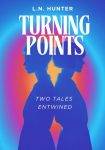 Turning Points – YA Short Stories - The paths of two young women weave around each other, bringing them together then pushing them away from each other—will they remain apart forever?
Turning Points – YA Short Stories - The paths of two young women weave around each other, bringing them together then pushing them away from each other—will they remain apart forever?
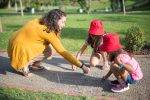 4 Ways Nannies Can Celebrate Diversity With Kids - Is your family a family of mixed cultures, or do you simply want your children to learn about more cultures and engage with them from a very young age? This can have a huge impact on their development and diversity, and can be exactly what forms their personality. How can you achieve this? Parents usually ...
4 Ways Nannies Can Celebrate Diversity With Kids - Is your family a family of mixed cultures, or do you simply want your children to learn about more cultures and engage with them from a very young age? This can have a huge impact on their development and diversity, and can be exactly what forms their personality. How can you achieve this? Parents usually ... The Pinglish Project - Paul Gough from the Pinglish Project has translated these four books, available on our website, into Pinglish:Pinglish makes it very easy for English second-language speakers to pronounce words.
Pinglish is English only the spelling is different.
The Pinglish Project - Paul Gough from the Pinglish Project has translated these four books, available on our website, into Pinglish:Pinglish makes it very easy for English second-language speakers to pronounce words.
Pinglish is English only the spelling is different. The JC Team Volume 3 – Bible Stories - Another great collection of biblical stories about Jesus from Sr Mary Joe. Stories include Dave’s Dilemma, Martha and Mary, Taking the Step, Jesus’ Family, The Centurion’s Boy, The Curse? Peter’s Secret Wish, Jairus’ Daughter. Sample Page from The JC Team Volume 3 Download or read online the full children’s ebook by selecting one of the ...
The JC Team Volume 3 – Bible Stories - Another great collection of biblical stories about Jesus from Sr Mary Joe. Stories include Dave’s Dilemma, Martha and Mary, Taking the Step, Jesus’ Family, The Centurion’s Boy, The Curse? Peter’s Secret Wish, Jairus’ Daughter. Sample Page from The JC Team Volume 3 Download or read online the full children’s ebook by selecting one of the ... Why Diversity in Children’s Books Shapes Better Understanding Early On - Children’s literature exposes children to diverse stories and characters and helps them cultivate a better appreciation for differences in culture, race, and family structures. Children read about characters who differ from them, and they naturally start to form connections that improve their empathy and awareness. Growing up, children need to see themselves represented in stories ...
Why Diversity in Children’s Books Shapes Better Understanding Early On - Children’s literature exposes children to diverse stories and characters and helps them cultivate a better appreciation for differences in culture, race, and family structures. Children read about characters who differ from them, and they naturally start to form connections that improve their empathy and awareness. Growing up, children need to see themselves represented in stories ...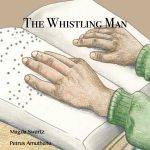 The Whistling Man - A charming free children's storybook about the visually impaired for early grades.
The Whistling Man - A charming free children's storybook about the visually impaired for early grades. 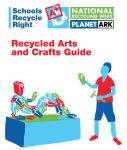 Recycling Arts and Crafts Guide – Planet Ark - Recycling Arts and Crafts free children's ebook is a fun collection of crafts made from recycling - perfect for schools, homeschoolers, families, and all children, young and old.
Recycling Arts and Crafts Guide – Planet Ark - Recycling Arts and Crafts free children's ebook is a fun collection of crafts made from recycling - perfect for schools, homeschoolers, families, and all children, young and old.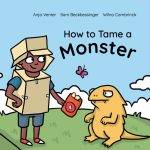 How to Tame a Monster - Lwando’s sister Oyiso is sometimes very cute, but sometimes she is a monster! Can Lwando tame the monster? Find out in this beautifully illustrated book from BookDash. Sample Page from How to Tame a Monster <End of Page 2 of 24> Download or read online the full free children’s ebook by selecting one of the ...
How to Tame a Monster - Lwando’s sister Oyiso is sometimes very cute, but sometimes she is a monster! Can Lwando tame the monster? Find out in this beautifully illustrated book from BookDash. Sample Page from How to Tame a Monster <End of Page 2 of 24> Download or read online the full free children’s ebook by selecting one of the ...










Yes I enjoyed it
My child really enjoyed this book. She laughed along with T. Sundari.
g o o d ! ! ! ! ! ! ! !